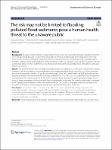Item Infomation
Full metadata record
| DC Field | Value | Language |
|---|---|---|
| dc.contributor.author | Weber, Alexandra | - |
| dc.contributor.author | Wolf, Stefanie | - |
| dc.contributor.author | Becker, Nadine | - |
| dc.date.accessioned | 2023-08-14T06:45:22Z | - |
| dc.date.available | 2023-08-14T06:45:22Z | - |
| dc.date.issued | 2023 | - |
| dc.identifier.uri | https://link.springer.com/article/10.1186/s12302-023-00765-w | - |
| dc.identifier.uri | https://dlib.phenikaa-uni.edu.vn/handle/PNK/8801 | - |
| dc.description | CC-BY | vi |
| dc.description.abstract | Because of global climate change, extreme flood events are expected to increase in quantity and intensity in the upcoming decades. In catchments affected by ore mining, flooding leads to the deposition of fine sediments enriched in trace metal(loid)s. Depending on their concentration, trace metal(loid)s can be a health hazard. Therefore, exposure of the local population to flood sediments, either by ingestion (covering direct ingestion and consuming food grown on these sediments) or via inhalation of dried sediments contributing to atmospheric particulate matter, is of concern. | vi |
| dc.language.iso | en | vi |
| dc.publisher | Springer | vi |
| dc.subject | global climate change | vi |
| dc.subject | catchments | vi |
| dc.title | The risk may not be limited to flooding: polluted flood sediments pose a human health threat to the unaware public | vi |
| dc.type | Book | vi |
| Appears in Collections | ||
| OER - Khoa học môi trường | ||
Files in This Item:

